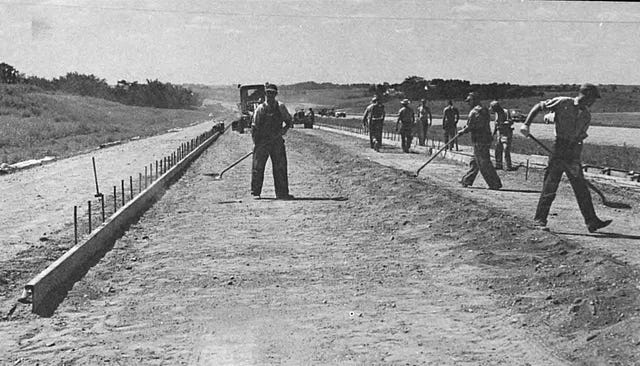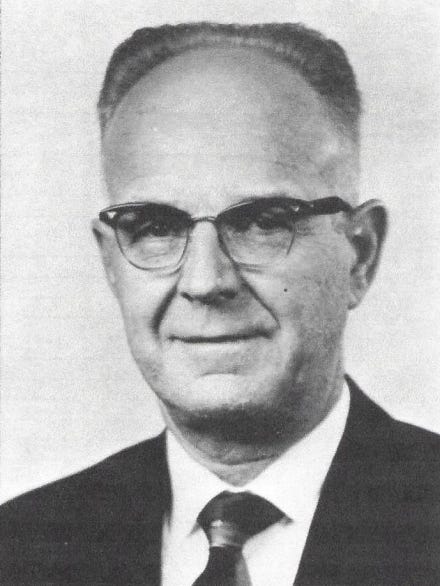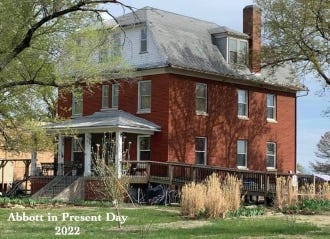There are always a thousand stories to
tell, and the telling goes as deep as anything we know. I
loved those happy Ulysses years, love to remember them, and love to tell about them from time
to time.
We arrived in Ulysses near New Year's
Day 1971. I was 5 and had three siblings: 7, 2, and 5 months. Our
first house was at the far edge of a new subdivision on the Northeast
corner of town. You could take Missouri Street North, pass a flower
shop and the old Hungarian mechanic's back yard shop, past a public
housing area and the dirt track by Hickok school. There was a
park on your left followed by an old folks home.
Next you would come to that main cross
road – Patterson -- that led out to the famous railroad bridge, go
two more blocks or so and hit a wheat field. The airport was a mile
distant to the West and our house was a brand new little brick place
that we rented right on the corner where Missouri St. met farmland.
It was so new there were sink holes in the back yard left over from
excavation. We parked our Ford 500 in the front yard, friends
unloaded the farm truck that served as a U Haul, and my folks set up
house.
We only lived there a year or so but as
memories go that little three bedroom home with a full, unfinished
basement is etched in my mind. Someone was building another house
next door in that first year, and the backhoe was fascinating. We had
neighbors, especially the Akagi family whom I knew in school and
always enjoyed knowing. Others from surrounding homes I remember by
face or experience, but not name.
Of course there was the first year
walking to Sullivan for Kindergarten. Who walks that far anymore? We
did, and thought little of it. I passed the time on the way to school
by kicking rocks and swinging sticks, once to the dismay of my elder
sister, a second grader walking along side. I was oblivious and
energetic, and the end of my stick found her eye one morning. My
teacher had a stern word for me when we got to school, and my sister
was at the eye doctor before the day was over. No more swinging
sticks while walking!
Sullivan was good though I've forgotten
my teacher's name. It was larger than the little country school I had
attended far away in Miltonvale for first semester. I still remember
the circle drive where my Mom would sometimes drop me off and say
cheerily, “Let your light shine for Jesus.” I think of it now
with gladness, though I often left the admonishment unfulfilled!
The next year I went to Hickok for first grade. This was a much shorter walk, all decked out in my Sears Toughskin pants and a new shirt. Mrs. Bowen was my teacher, nearing retirement and seeming old, like every adult does to a 1st grader I suppose. I loved her and knew where she lived in later years – seems like it was on my way to Kepley, maybe Baughman at Sykes or somewhere in there. I loved Mrs. Bowen even though she gave me a swat for tripping my friend, Troy. Life was pretty real then.
And I received other swats at Hickok,
not for the telling now, except for this near miss. In first grade we
were in the lunch room acting as boys will do. I was sitting next to
my friend, Dale. “Get over there by your girlfriend,” I said
playfully, pushing him away as we sat on the cafeteria table benches.
“Get over there by yours!” he shouted back, shoving me in return.
Without warning a man grabbed my left elbow and Dale's right, yanked
us off of the bench, and marched us into the office adjoining the
cafeteria. I was terrified. The Principal, Mr. Welch, knew we needed
attention and he definitely had ours. I still remember the long
narrow paddle with holes in it. He got it out of the bottom drawer
and laid it on the desk where we could see it plainly.
I was a tender soul and some would say
this was too much, even traumatizing. But I am not so sure. It put
fear in me, and fear is what is needed sometimes, or so seems to me.
I can assure you the idea of shoving a friend in the cafeteria never
again entered my mind. Lesson learned! After a stern lecture he set
us free, the paddle back in the drawer un-used.
There were other memories at Hickok. My
teachers were, I think, a Mrs. MacArthur who taught us Spanish a
little in the second grade. Another lady whose name slips my mind
filled in for awhile in 1972 second grade – she also taught us kids
piano lessons and lived over on Ulysses Parkway or adjacent. In fact,
seems she had a bad accident and it may have been Mrs. MacArthur
filling in for her. Third grade was Mrs. Day and I once got into
well-deserved trouble with her in which I barely dodged the bullet.
Fourth grade was good – I learned how
to multiply – and I can see the teacher's face but forget the name.
Fifth grade was Mrs. Bender and she made a good positive impact with
reading and other qualities of her class. I once remember, with
childish innocence, telling a racially crass joke and receiving a
hasty correction. Years later I had occasion to chat with her son,
Gary, the noted broadcaster, and it was good reminiscence on Ulysses
and her teaching life.
I think a Mrs. Oches taught music
there, including occasional days when we would all play random
instruments. And there were creative escapades into things like
square dancing. PE was always fun with some pretty tough and
challenging exercises, like holding the parachute all on the edge in
a circle and pulling it up and down while balls bounced in the
middle. Team work, strain, unusual muscles, and awkward all rolled
into one.
And there was always something like a
field day at the end of the year when, to my delight, Sullivan would
send over their teams, or vis a vis, and we would have, among
other things, a great softball game out on the playground.
Not long before we moved to Ulysses, I
am told, someone lost there life at the electrical site on the south
end of the Hickok school property. That always made me sad and
thoughtful when I would go on that part of the playground. And among
other things at Hickok there were the occasional after-hour
activities for 4-H or music recitals that brought me into the
building and I would see the halls, dark and mysterious behind the
barricades.
I loved Ulysses and I loved Hickok,
principal's office and fear of paddles notwithstanding. And I am
deeply grateful for all those who gave their gifts and love and labor
to help me and my siblings get through those happy years of school.












